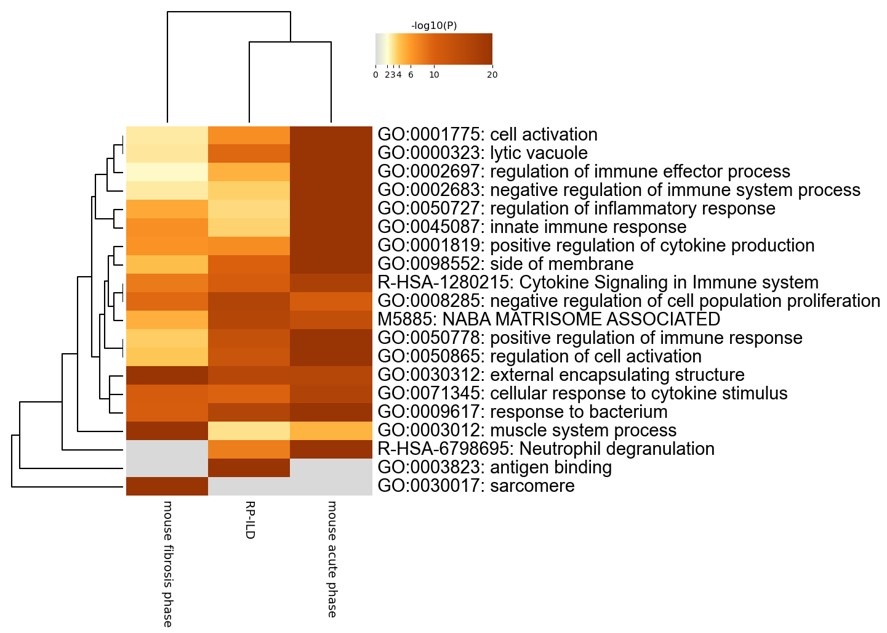Session Information
Date: Sunday, November 17, 2024
Title: Muscle Biology, Myositis & Myopathies – Basic & Clinical Science Poster II
Session Type: Poster Session B
Session Time: 10:30AM-12:30PM
Background/Purpose: Anti-Melanoma differentiation associated gene 5 (MDA5) antibody-positive dermatomyositis (DM) frequently presents with rapidly progressive interstitial lung disease (RP-ILD), leading to a high mortality rate during the acute phase. The etiology of the disease remains unknown due to the high mortality rate and the lack of an adequate disease model mimicking anti-MDA5 antibody-positive ILD. Recently, we established a new murine model that mimics anti-MDA5 antibody-positive ILD by immunizing with recombinant MDA5 protein. Here, we compared the transcriptome of the murine model with lung samples from a patient with anti-MDA5 antibody-positive RP-ILD, and explored new disease markers for anti-MDA5 antibody-positive ILD.
Methods: Transcriptome sequencing was performed on lung samples from the MDA5-induced ILD model. C57BL/6 mice were immunized with four intradermal injections of an emulsion containing recombinant mouse MDA5 full-length protein and complete Freund’s adjuvant (CFA) weekly, followed by intraperitoneal injection of pertussis toxin (PT) and intranasal administration of polyinosinic-polycytidylic acid [poly (I:C)] on day 21. Lung samples were collected on day 22 (acute phase) and day 35 (fibrotic phase). Control mice were treated with the adjuvants, CFA, PT and poly (I:C). Differentially expressed genes (DEGs) were identified as those with a false discovery rate < 0.05. DEGs from the murine model were compared with a gene list showing highly variable expression levels, detected from the lung sample of a 74-year-old woman with anti-MDA5 antibody-positive RP-ILD when compared to a healthy lung sample (|fold change| >5). Gene set enrichment analysis was performed using Metascape (https://metascape.org/gp/index.html).
Results: From the lung transcriptome of the murine model, 686 and 460 DEGs were detected in the acute and fibrotic phases, respectively. Twenty genes were upregulated DEGs in both phase, and 60% of them were also upregulated in human lung sample, including UPK3B and LRRN4, which known to be mesothelial cell markers. Compared with DEGs from mouse lung sample to the gene list from the patient’s lung sample, which contained 519 genes, GO: 0030312 (external encapsulating structure) and GO: 0071345 (cellular response to cytokine stimulus) were identified as enriched gene sets in all three gene lists (Figure 1).
Conclusion: Transcriptome analysis of the murine model and disease lung samples of anti-MDA5 antibody-positive RP-ILD revealed not only the upregulation of fibrotic genes but also the upregulation of mesothelial cell markers in the lung, consistent with previous studies on idiopathic pulmonary fibrosis. These findings suggest potential new biomarkers for ILD.
To cite this abstract in AMA style:
Ichimura Y, Konishi R, Iida T, Negishi K, Okiyama N. Comparative Transcriptome Analysis of Murine Model and Human Samples in Anti-Melanoma Differentiation Associated Gene 5 Antibody-positive Rapidly Progressive Interstitial Lung Disease [abstract]. Arthritis Rheumatol. 2024; 76 (suppl 9). https://acrabstracts.org/abstract/comparative-transcriptome-analysis-of-murine-model-and-human-samples-in-anti-melanoma-differentiation-associated-gene-5-antibody-positive-rapidly-progressive-interstitial-lung-disease/. Accessed .« Back to ACR Convergence 2024
ACR Meeting Abstracts - https://acrabstracts.org/abstract/comparative-transcriptome-analysis-of-murine-model-and-human-samples-in-anti-melanoma-differentiation-associated-gene-5-antibody-positive-rapidly-progressive-interstitial-lung-disease/

